
THE WIFE REVIEW – GLENN CLOSE IS UNREADABLY BRILLIANT AS AUTHOR’S SPOUSE PLUNGED IN LATE-LIFE CRISIS
12th Sep, 2017
THE WIFE REVIEW – GLENN CLOSE IS UNREADABLY BRILLIANT AS AUTHOR’S SPOUSE PLUNGED IN LATE-LIFE CRISIS
12th Sep, 2017
The Guardian by Peter Bradshaw
As the apparently-perfect wife of a Nobel prize-winning writer, Close gives arguably her best ever performance in an adaptation of Meg Wolitzer’s novel.
“There’s nothing more dangerous than a writer whose feelings have been hurt.” The speaker is Joan Castleman, the charming, enigmatically discreet and supportive wife of world-famous author and New York literary lion Joe Castleman. It is a fascinating and bravura performance from Glenn Close, in this hugely enjoyable dark comedy from director Björn Runge, adapted by Jane Anderson from the novel by Meg Wolitzer. Perhaps it’s Close’s career-best – unnervingly subtle, unreadably calm, simmering with self-control. Her Joan is a study in marital pain, deceit and the sexual politics of prestige. It’s a portrayal to put alongside Close’s appearances in Dangerous Liaisons and Fatal Attraction. This is an unmissable movie for Glenn Close fans. Actually, you can’t watch it without becoming a fan – if you weren’t one already.
A nervy, compelling performance from the Oscar-winning actor dominates this unconventional morality play from the writer/director of Nightcrawler
The Castlemans are on the plane to Sweden, ready for Joe to get the Nobel prize. Yet they are being pestered on the flight by a certain Nathaniel Bone, part stalker-fan, part parasitic hack who wants Joe to cooperate with a warts-and-all biography he is planning to write. Joe gives him the contemptuous brush-off but Joan cautiously advises a more diplomatic treatment. It is a key moment in this hugely enjoyable drama when things begin to fall apart.
Jonathan Pryce is excellent as the cantankerous and conceited old writer, a man now childishly addicted to praise and luxuriating in his colossal quasi-Bellow reputation. Christian Slater is the insidious and dangerous Bone. Max Irons plays Joe’s moody son David who also has plans to be writer, desperately needing the old man’s approval and yet prickly and resentful at Joe’s sorrowing criticisms of his work – criticisms which do not convey any great reassurance that his son has chosen the right career. And there is an unsettling moment in his Stockholm hotel suite when the great man appears not to recognise the name of one of his own characters. Is Joe succumbing to dementia?
And of course Close plays Joan, a woman much loved and admired within Joe’s circle of acquaintance: supportive helpmeet, mother – soon to be grandmother – and deeply affectionate spouse, apparently happy with a life lived in the titan’s shadow. Yet everyone is aware of a difficult truth; despite Joe blandly telling people at these cocktail parties that his wife “doesn’t write”, Joan had her own literary ambitions as a young woman. Joe’s moment of Nobel triumph appears to be triggering a late-life crisis in Joan.
Flashbacks to the 1950s and 60s show her as a co-ed taking a creative writing class with the young, insufferably pompous and married Professor Joe Castleman – who has himself only published minor short stories. She flirts, babysits his children and submits an outrageously seductive short story to his class, entitled The Faculty Wife. Things go as expected and soon Joan is wife number two, with a perennial suspicion that as Joe’s eye once roved to her, it could rove on to other people. Joe continues to stray, right up to the Nobel ceremony – and the film’s present-day section is set in the Clinton 1990s, when denying having sexual relations with younger women had become a political trope.
The film shows how Joan’s own literary ambitions began to wither in that sexist time and place: Elizabeth McGovern has an amusing cameo as an embittered minor author who advises her to give it all up. Later she gets a job as a reader in a publishing house whose smug and cynical editors are looking for “a Jewish writer”. Shrewdly, she puts Joe’s manuscript forward and his journey to greatness has begun.
The intrusive and insistent Bone thinks he has figured out the secret of Joe’s success and that of their troubled marriage. The drama resembles something like John Colapinto’s About the Author or James Hadley Chase’s Eve. Yet for all Bone’s investigative excitement, the movie shows he still does not fully understand the truth about them, and perhaps Joan has herself not fully understood the nature of her wifely submission until that moment. The final plot turn can be read as a parable for patriarchal politics and the artist’s prestige: when people read novels, they are not merely responding to a text, they are consuming the artist’s prestige and reputation, which is itself a created performance. It is a smart, supremely watchable and entertaining film, and Close gives a wonderful star turn.
